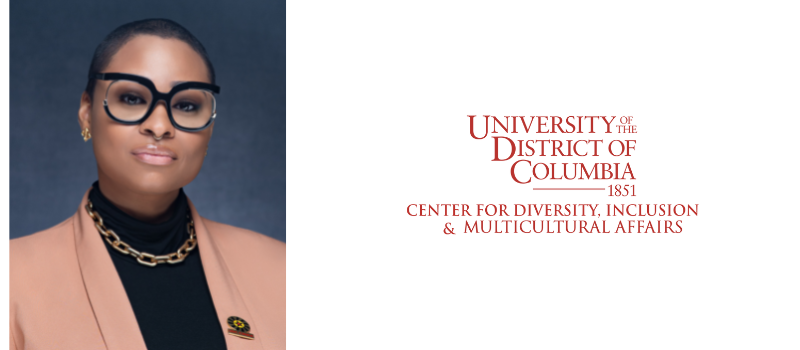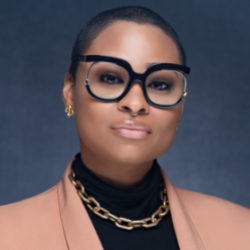
Center for Diversity, Inclusion & Multicultural Affairs director helps students find their voices
Center for Diversity, Inclusion & Multicultural Affairs director helps students find their voices

A formidable force in fighting for social justice and the rights of the LGBTQ+ community, Trinice McNally (she/her/hers) was born to lead. A feminist, nationally recognized transformative leader and community organizer, McNally is the founding director of UDC’s Center for Diversity, Inclusion & Multicultural Affairs (CDIMA), which provides a welcoming environment for diverse student populations, specifically LGBTQ+/non-binary, international, migrant and first-generation students.
Born in London with Jamaican lineage, McNally grew up in Miami. Her student activism was launched after experiencing voids of understanding and compassion for herself and other students struggling with their sexual identity at Bethune-Cookman University, an HBCU in Daytona Beach, Florida.
“I remember going to our counseling service center at the beginning of my sophomore year, as I was grappling with my sexual orientation. I wanted a safe place to explore and understand the spectrum of sexuality and gender and needed support to help me make sense of how I understood myself,” McNally said. “My counselor at the time pulled out oil and proceeded to pray, and I told him ‘I don’t think I need your prayers.’ It was very inappropriate and dismissive. I know I was not the only students he had done that to.”
McNally quickly became a go-to person on campus, supporting other students struggling with their sexual identity and demanding change at the University.
“I spoke up at a town hall,” she said. “I was tired of being the mom of so many LGBTQ+ people on campus because I struggled to figure out my own life.”
Her activism and that of other students brought about change, and she gained a mentor in Dr. Joi Niles, Bethune’s first Black lesbian therapist. “We bonded through her leadership and bravery because people gave her flack. She gave me a lot of support and strategic insight.”
McNally founded the first Gay-Straight Alliance at Bethune-Cookman in 2012, where she earned her undergraduate in psychology and a master’s in transformative leadership. Because of her research on the best practices to support LGBTQ+ students at HBCUs, she convinced Bethune-Cookman’s president to create the first diversity center for LGBTQ+ students.
Her career journey included working as the program manager of the HBCU LGBTQ+ Equality Initiative of the National Black Justice Coalition, coordinator of the LGBTA Resource Center at North Carolina Central University, and training seven HBCUs around the country, including UDC, by providing LGBTQ-Inclusive cultural competency training.
In 2018, McNally founded UDC’s Center for Diversity, Inclusion & Multicultural Affairs. It is the first center of its kind that supports LGBTQ+ students, first-generation college students, international students and students on the margins of society.
“Out of 103 HBCUs left, only five of them have LGBTQ+ centers,” McNally said. “Two of them have multicultural centers, including UDC.”
Of the five HBCUs with LGBTQ+ centers, McNally helped create three of them.
“The CDIMA is the place at UDC where historically marginalized and underrepresented students come to learn how to build power on the campus and in their community. It’s a place we try to make safe. There’s nothing I can do to control the behavior or speech of someone else. Still, I can try to curate a space that provides resources, literature and materials to help you thrive in your collegiate experience. ”
The center supports student leaders in three organizations: the Alliance Group (T.A.G.), which works to transform the culture, perceptions and experiences of LGBTQ+ students at UDC; the Caribbean Student Association, which includes UDC international and first-generation students and those interested in the Caribbean; and Migration Matters, the first organization of its kind at an HBCU to support Deferred Action on Childhood Arrivals (DACA) and undocumented students, those with temporary protective status, seeking political asylum or refugees.
Students are given opportunities through programs, including the Short-term Study Abroad Education Travel program, which was established as an annual program by the Division of Student Success and Development and is hosted by CDIMA. Students receive travel scholarships. The Social Justice Ambassadors (SJAs) program is a leadership development fellowship offered through CDIMA. PepsiCo seeded it, and it is now fiscally supported by the UDC Foundation. Selected students learn to advocate for issues through workshops, retreats and volunteer opportunities.
CDIMA aids with visa extensions, transfers and application procedures for admission to the University. Undocumented students are provided with guidance and support. There are resources for those who qualify for the Development, Relief, and Education for Alien Minors (DREAMers) Act, DACA recipients and political asylum seekers. LGBTQ+/non-binary identifying students are provided a climate that educates the UDC campus community through intergroup dialogue, awareness events, community engagement and national and local partnerships. Also, first-generation students are provided services and opportunities to improve academic achievement and increase retention and social integration.
“I’m proud of the work that we are doing here,” McNally said. “We’ve trained close to 1,000 people. Our students have graduated, and they are leaders in their industries. I’m proud that we have an LGBTQ+ scholarship in honor of Essex Hemphill, a 1982 alumnus of UDC and a gay Black man. We have the LGBTQ+ Advisory Council that we launched and have all-gender restrooms on campus. We are providing students with the opportunity to travel abroad.”
McNally says there’s no place she’d rather be.
“Our success is important. It’s an honor to do this work at UDC.”
Learn more about CDIMA, UDC’s Center for Diversity, Inclusion, and Multicultural Affairs.